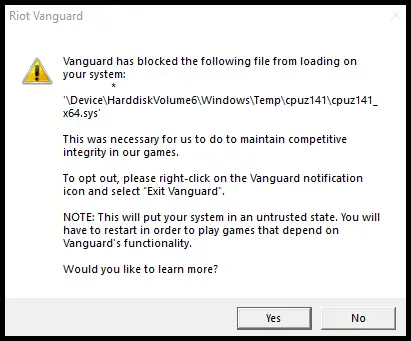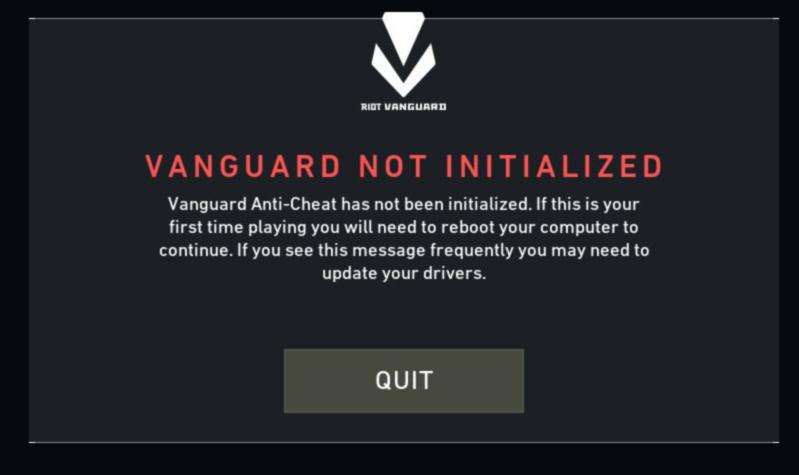
Riot releases new fix for Vanguard’s aggressive driver blocking
Riot Games released a patch for Valorant’s anticheat Vanguard, which the developer says will stop the program from blocking essential drivers. The fix comes nearly a week after WIN.gg’s report that Riot’s anticheat system was actively blocking the drivers that controlled cooling systems for PC hardware from a variety of manufacturers.
The fix targets a program called CPU-Z, a hardware monitoring tool included with many active cooling systems from manufacturers like Corsair and NZXT. The program, packed into the drivers of aftermarket hardware coolers, was recently found to have a security vulnerability that hackers could use to cheat in online play. When Vanguard was updated in the second week of Valorant’s open beta, users started to notice that Vanguard had blocked the CPU-Z hardware utility.
In an hour we’re shipping a hotfix for Vanguard to +up its compatibility with cheat-vulnerable drivers. Most of the previously blocked drivers should now work. Some egregious ones will cause the game not to start but now very few will be blocked outright. Thanks for the feedback.
— VALORANT (@PlayVALORANT) May 7, 2020
The startup warning was followed by some tense moments as users failed to hear the telltale whir of fans and water pumps coming from their cases. Without the temperature information passed from CPU-Z, cooling systems failed to start, interpreting the lack of data from the blocked program as a sign that the PC was off or failing entirely. Luckily, most coolers have the ability to save fan and pump profiles directly to their memory, but Vanguard’s aggressive blocking of the drivers drew ire from affected users, and even Corsair themselves, for putting components in danger.

In a statement to WIN.gg, Corsair called Vanguard “aggressive,” saying that both Corsair and CPU-Z developers CPUID were working on a fix for the vulnerability. Corsair declined to comment as to whether the hardware and peripheral company was also working with Riot to fix the issues.
Vanguard driver fix comes with new issues
With Vanguard’s recent patch, it looks like player’s systems are safe for the time being. Unfortunately, the patch seems to have introduced an entirely different issue. After updating Valorant, many users are unable to connect to Riot’s first-person shooter.

Comments on Valorant’s tweet announcing the CPU-Z fix were flooded with complaints from players receiving the “Vanguard not initialized” error when starting the game accompanied by the same screen that shows after if a user tries to start Valorant before restarting their system after install.
So far, fixes range from a simple restart to a complete reinstallation of Valorant and its anticheat. As of this writing, Valorant’s official Twitter hasn’t commented on Vanguard’s new bug.
Despite mass excitement for Riot’s new game, many have expressed anger towards the developer for the level of computer access that Vanguard requires. The program requires root and kernel permissions to a player’s machine, which some see as extreme. While that level of access is a tough ask for some players, it’s needed for the new engine to actually catch any cheats.
Today, most cheats are injected as a process before the cheater even opens the game, bypassing the scanning that most anticheat systems, such as Valve’s VAC network, perform at the game’s startup. By essentially doing all of its work ahead of time, the cheat is already beyond the reach of most anticheat programs that only scan for changes that occur after a game is running. In other words, if players want games free of hackers, programs with deep access like Vanguard are their best bet.
Recommended

Does Content Warning have VR?
As a game focused on sharing your spooky encounters, Content Warning seems like the perfect game for...

Diablo 4 Thorns: How does it work?
It’s a simple, but powerful substat.

All the methods and secrets for quickly increasing your rank in Call of Duty Warzone 2
CoD Warzone is one of the most dynamic projects in the battle royale genre, which allows players to...





